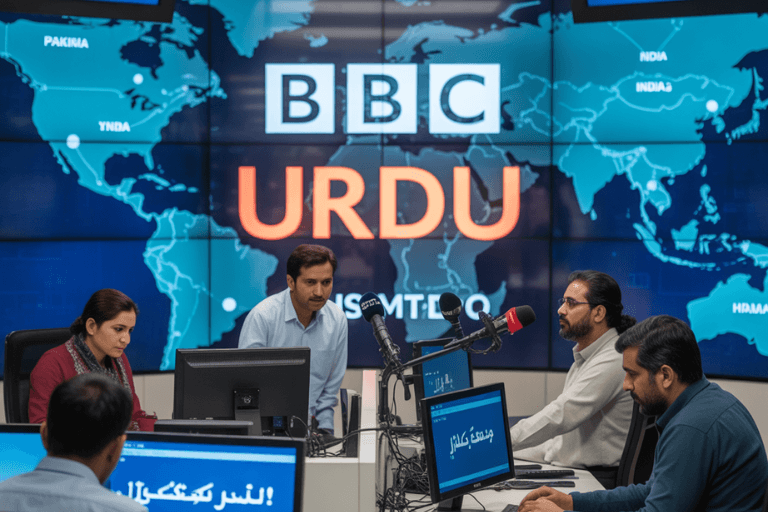Introduction
In today’s fast-paced digital age, BBC Urdu has established itself as one of the most trusted news sources for millions of Urdu-speaking audiences around the world. As part of the British Broadcasting Corporation (BBC), the Urdu-language service delivers credible, unbiased, and timely news to Pakistan, India, and the global Urdu diaspora. From breaking political updates to deep cultural insights, BBC Urdu plays a vital role in shaping public opinion and connecting Urdu speakers with global developments.
The Legacy and Background of BBC Urdu
BBC Urdu began its journey in 1941, during World War II, as part of the BBC World Service. The goal was to provide authentic information to South Asian listeners in their own language. Over time, it became a symbol of independent journalism — trusted for its fact-based reporting and fearless coverage.
Unlike many local media outlets that may face political or commercial influence, BBC Urdu maintains editorial independence, ensuring that its readers get the truth, free from manipulation. The Urdu service broadcasts across multiple platforms, including radio, television, and digital media, reaching millions daily.
BBC Urdu in the Digital Age
As technology evolved, BBC Urdu shifted its focus from traditional radio to digital journalism. Today, its website (bbc.com/urdu) and mobile app are among the top news destinations for Urdu readers worldwide. The platform provides:
- Breaking news alerts
- Exclusive interviews and reports
- Video explainers and documentaries
- Podcasts and talk shows
Social media has also become a powerful channel for BBC Urdu. Its YouTube channel, Facebook page, and X (Twitter) account collectively reach millions, especially the youth who prefer short-form video news and live updates.
Coverage Areas and News Focus
BBC Urdu covers a wide range of topics to serve its diverse audience:
- National and International News: Politics, governance, economy, and global relations.
- Social and Cultural Stories: Exploring the changing social fabric of Pakistan, India, and other Urdu-speaking regions.
- Sports Updates: Detailed coverage of cricket, football, and international tournaments like the ICC World Cup, PSL, and Olympics.
- Science and Technology: Insights into innovation, space exploration, and digital trends.
- Entertainment and Arts: Reporting on films, music, literature, and celebrity interviews.
This balanced coverage makes BBC Urdu more than a news outlet — it’s a cultural bridge between the Urdu world and global perspectives.
Why People Trust BBC Urdu
The success of BBC Urdu lies in its core values — accuracy, neutrality, and human-centered storytelling. Its journalists are trained to follow the BBC’s global code of conduct, ensuring:
- Fact-checking and verification before publishing any news
- Balanced viewpoints on controversial issues
- Protection of journalistic sources
- Transparency in corrections and updates
In regions where misinformation spreads rapidly through social media, BBC Urdu’s credibility provides clarity and trust. Readers often rely on BBC Urdu to confirm the authenticity of trending news and viral claims.
BBC Urdu’s Role in Pakistan
Pakistan remains one of BBC Urdu’s largest audiences, where the outlet has a strong influence on digital journalism. It frequently highlights:
- Issues of governance, corruption, and democracy
- Human rights stories, especially those related to women and minorities
- Cultural pieces showcasing Pakistan’s literature, history, and art
BBC Urdu’s team in Islamabad, Karachi, and London ensures continuous coverage of breaking events while providing context and background to help readers understand the bigger picture.
Challenges and Criticism
Despite its success, BBC Urdu has faced occasional criticism and challenges. Some governments and political groups have accused it of bias, especially during sensitive political events. However, the platform continues to stand by its editorial independence, reminding audiences that credible journalism often challenges power structures.
Another challenge is the rise of fake news and misinformation online. Competing with viral but unverified social media posts is tough, but BBC Urdu’s trust and verification processes keep it a step ahead in credibility.
BBC Urdu and Modern Journalism
BBC Urdu has successfully adapted to the era of multimedia storytelling. Its use of videos, infographics, podcasts, and interactive reports has attracted younger audiences. The service has also introduced BBC Urdu YouTube Shorts and Instagram Reels, combining creativity with factual reporting.
Moreover, it frequently collaborates with BBC English and BBC Hindi, producing cross-language stories that appeal to a wider South Asian audience. This integrated approach strengthens BBC’s overall influence in the region.
BBC Urdu’s Global Impact
For Urdu speakers living abroad — in the UK, Middle East, North America, and Europe — BBC Urdu acts as a link to their homeland. It keeps the diaspora updated on South Asian developments while providing global perspectives on key issues such as immigration, education, and international politics.
This global reach demonstrates that BBC Urdu isn’t just a regional platform — it’s an international voice for Urdu journalism.
Conclusion
In an age of misinformation and polarization, BBC Urdu continues to be a beacon of reliable journalism for Urdu-speaking communities around the world. Its combination of trustworthy reporting, technological innovation, and cultural sensitivity ensures it remains one of the most influential Urdu-language media outlets globally.
Whether through radio waves, websites, or social feeds, BBC Urdu stands for truth, integrity, and the power of informed storytelling — a true voice for millions who believe in honest journalism.

